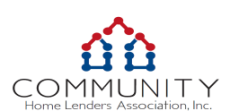CHLA Lauds Passage of
Transitional Licensing Bill
Legislation Underscores Need for Separate
Action on a Universal SAFE Act Test
Contact: Scott Olson For Immediate Release
(571) 527-2601 May 23, 2016
The Community Home Lenders Association (CHLA) praised the House of Representatives today for its approval today, by voice vote, of H.R. 2121, the “SAFE Transitional Housing Act of 2015.” The bill would give bank and other depository institution mortgage loan originators 120 days to complete the more rigorous SAFE Act testing and pre-licensing courses that are required when they go to work for a non-bank mortgage lender. Transitional Licensing has long been a CHLA legislative priority, with CHLA working with former Rep. Spencer Bachus, the original author of the SAFE Act, on a comparable bill Rep. Bachus introduced three years ago.
“CHLA commends the House for adopting transitional licensing, a good first step in addressing the significant disparity between bank and non-bank mortgage loan originator qualifications requirements,” said Scott Olson Executive Director of the CHLA. “We also renew our call for the CFPB to take the pro-consumer step of imposing a universal SAFE Act test requirement on all mortgage loan originators nationwide.”
These two issues are related, because transitional licensing is needed due to the significantly higher mortgage qualifications, including testing and pre-licensing SAFE Act course requirements, which apply to non-bank mortgage loan originators but don’t apply to bank and other depository institution mortgage loan originators. Since complying with these requirements and getting licensed by a state can take several months, mortgage loan originators at non-banks are reluctant to move over and work for banks since they may not be able to originate loans for several months. This is bad for these individuals, as well as the non-bank lenders who want to hire them – thereby reducing competition, which is bad for consumers.
H.R. 2121 would resolve this problem without harming consumers. The high non-bank mortgage loan originator standards are maintained – but individuals registered as a loan originator at a bank are given 120 days during which time they can work for a new non-bank lender, while they complete these higher requirements and receive a state license.
Ultimately, CHLA believes consumers would be best protected – and markets would be most competitive – if bank mortgage loan originators were subject to the same higher standards that mortgage originators at non-banks are. CHLA has previously written the CFPB, urging that it use its authority under the Dodd-Frank requirement that ALL mortgage loan originators must be “qualified” – to require that every mortgage loan originator nationwide must pass the basic SAFE Act mortgage competency test.
“Mortgage loan originators that work at banks and other depository institutions are the only mortgage and financial services professionals not required to take a basic competency test in order to work with consumers,” said Scott Olson, CHLA Director. “It is hard to understand, eight years after the great Housing Crisis, how mortgage loan originators that work at the big banks that played a significant role in the Crisis are exempt from this basic consumer protection requirement.”
